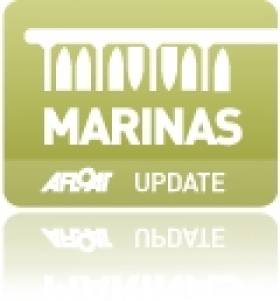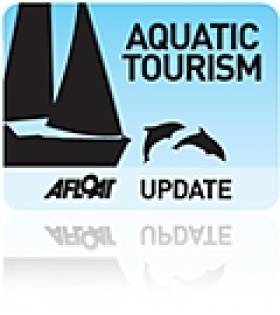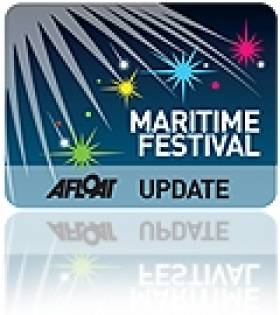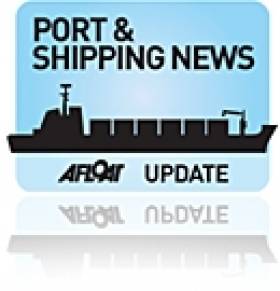Displaying items by tag: Rathmullan
The Department of Transport has been advised by Donegal County Council that it intends to begin refurbishment works at Rathmullan Pier and viaduct on the Fanad Peninsula north-east of Letterkenny.
These works are starting with immediate effect and will be ongoing for the next seven months until 30 November.
They are being carried out by marine civil engineering contractors working from a temporary compound at the head of the pier, using work vessels, a work pontoon, heavy civil engineering plant and equipment. Divers may also be employed on site from time to time.
For safety reasons, mariners are advised to avoid attempting to berth at Rathmullan Pier or pontoon as the ladders and stairway are to be removed and replaced, as well as the pontoon itself for the duration of the works.
Mariners are also advised to proceed slowly and with caution within the vicinity of Rathmullan Pier. Wave wash from vessels should be avoided.
For more details, including a map of the works area and contact information, see Marine Notice No 26 of 2024 attached below.
'Sailing Passport' Heralds New Era For ISA's Training Programmes
#ISA - It's shaping up to be a year of big changes for trainees, tutors and coaches with the Irish Sailing Association as the organisation evolves to meet the demands of 21st–century sailing.
After taking on board feedback from the training review that formed part of last year's five-year strategic plan, 2016 will see a number of new initiatives introduced – and trainee sailors will be among the first to see the benefits.
These improvements include the simplification of the Small Boat Sailing Scheme, and changes to instructor endorsements to better differentiate between training for specific skills and holistic coaching, as well as putting greater focus on gaining skills and logging time on the water rather than trainees simply collecting certificates.
One of the biggest shifts internally in the association is the introduction of new technological solutions to reduce administration time and associated costs to training centres throughout Ireland.
And for the ISA's current crop of trainee sailors, the public face of that will be the new 'Sailing Passport' scheme.
Essentially an online, cloud-based logbook – accessible from computers, tablets and smartphones anywhere there's an internet connection – the Sailing Passport will replace existing paper-based methods of recording on-the-water activities and achievements.
Whether racing, cruising or just having fun, trainees will be able to record their sailing activities in a format that allows them and their instructors to easily track their progress in acquiring and developing the skills needed for any particular course or module.
Trainees in the Small Boat Sailing Scheme will be the first to benefit from this initiative before it's rolled out to power boating, windsurfing, cruising and other activities across the board.
Patrick Blaney has been leading the research and development of the Sailing Passport for the ISA and is co-ordinating its introduction in association with the association's Regional Development Officers.
As he explains, the passport is a response to the perception expressed in feedback to the ISA's Strategic Review Group that the association's training schemes were too focused on certification landmarks over individual sailors' development of skills.
"It's also part of the ISA development strategy to grow the levels of sailing activity outside of the traditional structured courses, particularly for young sailors," he says.
"The passport, as an online logbook, is designed to facilitate this by focussing on skills and experiences, not on certificates, and to do so in the 'modern' way – dispensing with paper logbooks that are easy to lose or damage, while also enabling training programmes be distributed to users more efficiently online."
Inspiration for the Sailing Passport comes from a similar system in use by Sail Canada for the last five years. That project was developed by former sailing instructors with digital and sports management knowhow, and has since been adopted by skiing chiefs and other sporting organisations in Canada.
The ISA's version is licensed from a sister programme called ChecKlick, and is already fully operational for the Small Boat Sailing Scheme, loaded with all the relevant Joe Soap Cards for skills development that student sailors will see checked off by their club or instructor as they progress, whenever or wherever they access their secure passport online.
But the system also allows individual sailors to add their own records for activities, goals and achievements as they track their training steps with greater accuracy, making for a more holistic approach to sail training over the previous 'gotta catch 'em all' collection of certificates.
The end result also serves as a kind of 'sailing CV', says Blaney, particularly useful for those working towards accreditation as a coach or instructor.
Trialing of the system has lead to some early positive feedback including this from Aengus Kennedy, principal of Rathmullan Sailing and Watersports School in Co Donegal:
"We started to use the ChecKlick system in 2015. The system is straightforward to use and the online tutorials work well as training manuals. Staff were up to speed quickly. Instructors have the opportunity to update each students progress throughout courses from their smartphones or devices which they embraced. Being able to print either certificates or a list of tasks achieved for each student at our leisure is a distinct advantage. Having a database of all students work and not paper logbooks is a big improvement."
The Sailing Passport will mean reduced costs for sailors and administrators alike, with access to the system costing €3 per participant.
With current paper log books costing €5 a pop, and certificates at €2 each, the savings will be significant over time, Blaney underlines.
Yet the costs are secondary to the vision of a more nimble, focused ISA that this project represents, something also reflected in the streamlining of the Small Boat Sailing Scheme itself.
That sees the revision of its upper-tier modules into a single level for each of three streams – Advanced Boat Handing; Start Racing; and Kites & Wires & Adventure – and the introduction of a new single Advanced Instructor Endorsement which will enable more and more clubs and training centres to acquire the resources necessary to offer the full suite of training modules.
What this all ultimately means for trainees is more choice and more flexibility in terms of where they can go to learn the skills they need, and what paths they can take to hone their preferences on the water, without being discouraged by the need for certification in skills that may block their advancement.
The coming year will reveal whether the ISA's first raft of changes will indeed encourage a brighter future for Ireland's young sailors.
A sailing passport briefing document prepared by the ISA is downloadable below.
Rathmullan Marina. Yacht & Boat Berths & Storage on Lough Swilly
Rathmullan marina is a small marina pontoon at Rathmullan, a village in County Donegal is located on the western shore of Lough Swilly and is part of the Fanad Peninsula, situated roughly 12.5 miles from the Lough's entrance and 34 miles northwest of Londonderry/Derry.
The pontoon is suitable for small vessels to berth alongside at a reasonable fee and where fresh water is laid on. There is a concrete slipway suitable for dinghy landing. The Lough Swilly ferry also operates from the pier between Rathmullan and Buncrana, a journey of 45 minutes.
Watersports a Big Attraction on Lough Swilly
#TOURISM - Sailing, kayaking and surfing are just some of the attractions for watersports enthusiasts in Rathmullan, as the Sunday Independent reports.
Sophie Linehan visited the Donegal village on the shores of Lough Swilly ahead of last weekend's second annual SeaFest, which introduced novices to the delights of various aquatic sports.
And it wasn't hard for her to find a whole host of activities for all levels of experience.
Many of these are available at the not-for-profit Rathmullan Sailing and Watersports School, set up by American transplant Rick Le Vert - who 10 years ago had never been sailing himself!
Linehan and her companion were shown the ropes in an afternoon sailing taster session on the lough, which she describes as "the perfect place to learn to sail".
Lessons in surfing and stand-up paddle boarding are also easily availed of - the latter being a great introduction to those who might be a bit scared of the surf.
The Sunday Independent has much more on the story HERE.
SeaFest Celebrates Donegal's Coastal Heritage
The shores of Lough Swilly in Co Donegal will come alive with sails at SeaFest 2011 from 1-3 July, celebrating the region's unique coastal environment.
The weekend begins on Friday 1 July with the launch of MalinWaters, a new cross-border marine tourism initiative for the zone between the north of Ireland and western Scotland.
It's followed on the Saturday with a parade of sails and action in the Saldanha Cup, a traditional cruiser-racer sailing regatta that commemorates the 200th anniversary of the sinking of the frigate HMS Saldanha, with a course that takes on the wreck site of the ship near Ballymastocker Strand.
Among the myriad family events taking place on shore, SeaFest will also feature an abundance of Donegal's local food culture, such as fresh seafood from local waters, plus lamb, beef and pork from the county's field, prepared by talented chefs from the region.
For more details visit seafestloughswilly.com.
Donegal Ferry Services Under Review
The cross-border service is funded by Donegal County Council and Limavady Borough Council. The route in recent years has experienced an unfavourable exchange rate, increased cost of fuel, poor weather, a depressed tourism market sector and notably reduced construction traffic, contributing to a sharp decline in demand. In the current climate the local authorities may find it difficult to provide funding as they scale back on budgets.
Record levels in 2005/2006 saw traffic reach 106,179 vehicles and 302,740 passengers. Such was the success of the service annual subsidies for 2008 and 2009 were not required. According to the latest 12-monthly traffic figures for June 2009-June 2010, vehicle volumes dropped to 52,669 and passengers levels have decreased more than halve to 149,455.
The 10-minute route is operated by the 44-vehicle capacity Foyle Venture which served the Kilimer-Tarbert route for the Shannon Ferry Co. The mid-west estuary ferry was replaced by newbuild Shannon Breeze in 2000 and later sold to Lough Foyle Ferry Co.
When the Lough Foyle route began operations in 2002, the service received a subvention of €108,000 each from the local councils. Over that timeframe, the route has received a total funding of €500,000 from Donegal County Council.
In 2009, the two local authorities agreed to provide a €200,000 subvention, but this runs out in March 2011. An application has also been submitted to the Special EU Programmes Body for funding.
On the west side of the Inishowen Peninsula is the Bunbcrana-Rathmullan service, which is also in doubt if a subsidy from Donegal County Council cannot be maintained. The Lough Swilly route started in 2004 and is served by the 20-vehicle capacity Foyle Rambler, a former German river-ferry. The north-west ferry route takes 25-minutes and recorded 15,000 passengers at its peak.
In busier times, tourists from the North, instead of passing through Derry city, used the 'land-bridge' routes across the Inishowen Peninsula to reach holiday-homes and popular seaside resorts throughout Co. Donegal.
































































